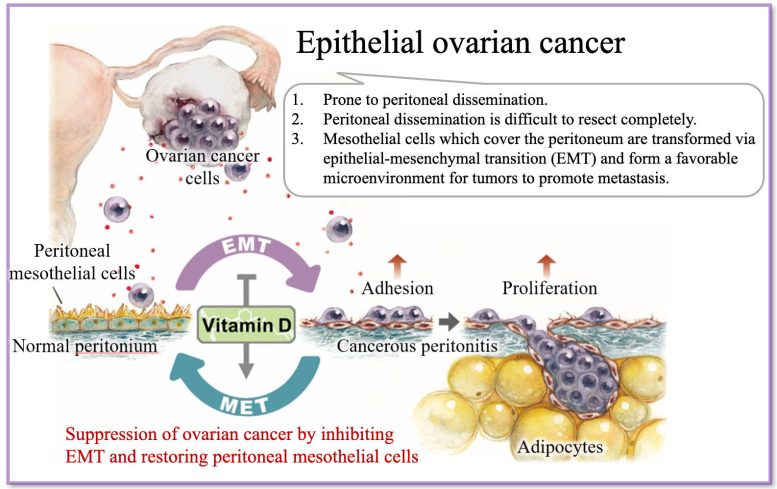
Vitamin D is a class of fat-soluble secosteroids that enhances intestinal absorption of calcium, magnesium, and phosphate, among other things.
Vitamin D can effectively block a key pathway used by ovarian cancer
Among all cancers, ovarian cancer has one of the highest mortality rates. This is due, in part, to the cancer’s ability to turn the body’s defenses against it. However, recent research from Nagoya University, which was published in the journal Matrix Biology, indicates that vitamin D may be able to successfully block one of the major pathways used by this cancer.
Ovarian cancer often undergoes a process called peritoneal metastasis. Its cells go to a secondary implantation location, such as the peritoneal wall or diaphragm, throughout this process after detaching from their primary site in the ovary. The peritoneum protects itself against this process by forming a barrier of mesothelial cells that prevent cancer cells from adhering and spreading. Ovarian cancer circumvents this barrier, however, by converting the shielding mesothelial cells into cancer-associated mesothelial cells. By fostering an environment that promotes metastasis, the cancer’s ability to metastasize and spread throughout the body is improved.

Suppression of ovarian cancer by the restoration of peritoneal mesothelial cells. Credit: Kazuhisa Kitami
The team, led by Dr. Masato Yoshihara of the Department of Obstetrics and Gynecology at Nagoya University Graduate School of Medicine, in association with colleagues at the Bell Research Center and the Department of Pathology, discovered that vitamin D not only hindered this process but also returned cancer-associated mesothelial cells to their initial state. This process improved the mesothelial cells’ capacity to act as barriers, limiting the spread of the cancer. Their research implies that adding vitamin D therapy to the treatment of ovarian cancer could be helpful.
“We showed the potential of vitamin D for normalizing cancer-associated mesothelial cells, which is the first study of this kind,” said Dr. Kazuhisa Kitami, the first author of the study. “This study’s most interesting point is that in situations where early detection of ovarian cancer is still extremely difficult, we showed that the peritoneal environment can be restored to its normal state where it prevents the adhesion and growth of cancer cells.”
Vitamin D can do this because of the complicated way cancer spreads. Previous studies found that cancer cells secrete a protein called TGF-β1, which is associated with cell growth. This also increases the amount of another protein, thrombospondin-1, through the TGF-β/Smad pathway. Thrombospondin-1 has long interested researchers of ovarian cancer because it is found in higher amounts in the later, more deadly stages of cancer. In ovarian cancer, thrombospondin-1 is a key protein that enhances the adhesion and proliferation of ovarian cancer cells to the peritoneum. As vitamin D disrupts the TGF-β/Smad pathway, it may prevent cancer.
Dr. Kitami explains: “The administration of Vitamin D helps normalize the peritoneal environment. This suggests that the combination of Vitamin D and conventional remedies can enhance their therapeutic efficacy for ovarian cancer. We think this helps prevent the adhesion of cancer cells to the peritoneum, which may make it possible to prevent the recurrence of ovarian cancer.”
The potential of a vitamin to combat a cancer that affects one in 75 women remains an exciting prospect, especially since it does so by restoring the natural defenses of the body. The creation of therapies using this research could offer new ways to combat the high death rate of ovarian cancer.
This study was supported by the Japan Society for the Promotion of Science (JSPS) Grant-in-Aid for Scientific Research (19H03797, 20K03824, 21K16788).
Reference: Kazuhisa Kitami, Masato Yoshihara, Satoshi Tamauchi, Mai Sugiyama, Yoshihiro Koya, Yoshihiko Yamakita, Hiroki Fujimoto, Shohei Iyoshi, Kaname Uno, Kazumasa Mogi, Yoshiki Ikeda, Akira Yokoi, Nobuhisa Yoshikawa, Kimihiro Nishino, Kaoru Niimi, Akihiro Nawa, Atsushi Enomoto and Hiroaki Kajiyama, 8 April 2022, Matrix Biology.
DOI: 10.1016/j.matbio.2022.03.003









Question: Am I right that Vitamin D also regulates each cells internal immune systems activity levels? So Vit D is working as an intracellular ‘hormone’ in this instance. So the cell defines its own Vitamin D levels in order to regulate itself, so would it not risk upsetting the cell’s intra-cellular systems to take more Vitamin D when the levels in our cells are tuned to their own set points?
Is taking a it. D supplement an ovarian cancer a preventative action?
Are rates of ovarian cancer more prevalent in those areas farther from the equator?
Cancer runs very heavily in my family. I found the article to be very beneficial to me because now i know the significance associated with the vitamin. I can now share what my mother thought us all along but couldn’t explain why. All she stated was ” these two vitamins are very important coupled with a miti vitamin is very important. Thanks for sharing material that’s beneficial to others.
S. Sonnier